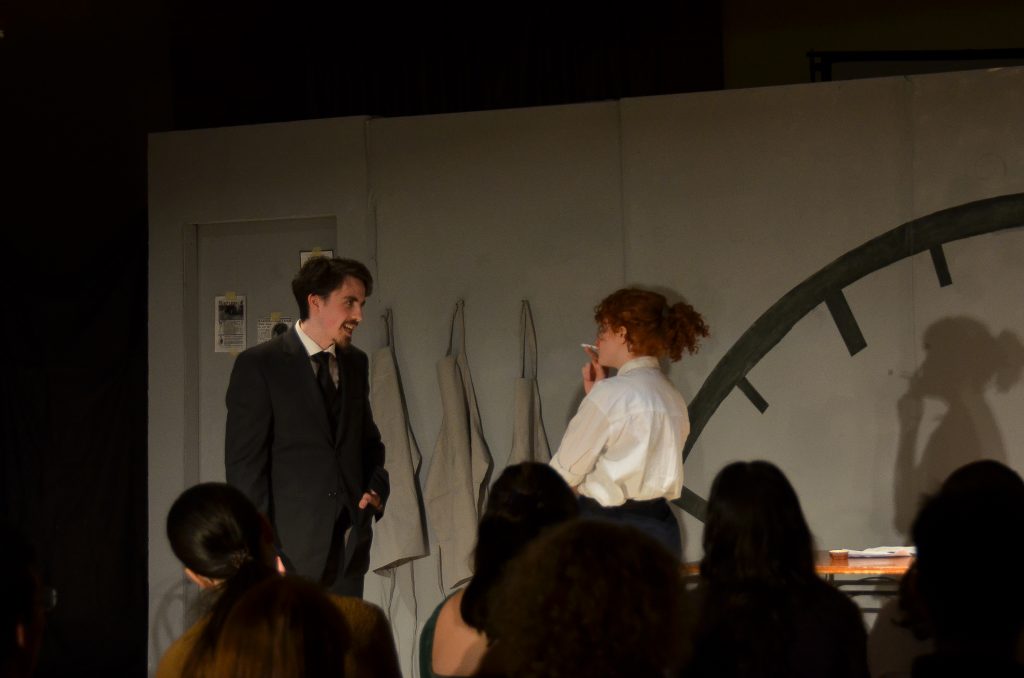Over the weekend, Hinman Production Company (HPC) put on “Radium Girls,” a play about the girls who worked with paint containing radium in the 1920s. The production included themes such as workers’ rights, scientific discovery and moral shortcomings.
The play follows a girl named Grace Fryer as she struggles to fight for justice after discovering that the radium paint she had used to paint clocks for the United States Radium Corporation was harming both her and her fellow workers. It was not known at the time, but radium is extremely dangerous, despite having positive results when treating cancer.
Grace Fryer was portrayed by Jessica Knaster, a sophomore majoring in psychology. Knaster explained how she was able to bring her character to life over the run of the show.
“As I’ve reread the script, I’m always finding new moments where I’m realizing this is her first experience being wronged by somebody or this is the first time she stood up for herself,” Knaster said. “[It’s] kind of thinking about what her thoughts would be and then applying that as I’m acting … also thinking about instances in my life that I can apply or how would I feel if someone as close as one of the characters was to her, if that happened to them.”
The work that was put into developing the characters was clear throughout the performance. This remained true even when characters were switching between different roles. Zoe Steinberg, one of the co-directors and a sophomore double-majoring in psychology and English, explained the challenges she faced while directing the play alongside Ian Moszynski, co-director and an undeclared sophomore.
“From the start, even from casting — because there are 37 characters in this show, and we only have a cast of 10 — we need to mix it around and see how that works,” Steinberg said. “And even from there it was a lot, but we took it all as it came. [My co-director, Moszynski and I] hang out. We’re friends, [so] work for the show isn’t really like work. The first two weeks of the show, I think [Moszynski] and I saw each other for at least 11 hours every day — it was a lot of planning.”
With such a small cast covering so many roles, “Radium Girls” used a mixture of props and costumes to differentiate between different people throughout the show. The play also leaned into the 1920s by including 20s music and clothing. There was also clarity given to how time passed through the roles of Sob Sister and Reporter, who directly stated the year to the audience under the guise of reporting the events in real-time.
The emotional story depicted by the company helps to cover crucial themes of workers rights that remain important today. Anne Muha, who portrays Sob Sister and is a first-year graduate student studying public administration, explained how her understanding of this topic motivated her to participate in this show.
“Part of the reason I wanted to do this show in the first place was because I think that this is a very important working class story to tell,” Muha stated. “In preparation for doing this play, I read a book about the radium girls, ‘The Radium Girls’ by Kate Moore … I do think it’s really important to tell and retell these kinds of cautionary working class laborer stories, so that we don’t forget the people who came before us and the sacrifices they made and remind ourselves not to take what we do have, in terms of labor regulation, for granted.”
Luke Sullivan, who played Arthur Roedar and is a junior double-majoring in English and history, continued this idea by explaining how this important story was a new step for HPC and how this affected cast relations throughout the run of the show.
“Something that I was wondering when going into this was, this is a drama, and we’ve only really done comedies here, at least in my time here,” Sullivan said. “So I was wondering, how is the cast going to connect when we’re dealing with such a heavy topic? But I think there’s a beauty in the black comedy that emerges from covering this topic, and I think that’s the way everyone comes together.”
The comradery displayed between the characters was apparent on stage. With such a serious subject manner, the actors were able to work with each other in order to put on a successful performance.
Moszynski explained the impact that this show and HPC as a whole has had on him.
“To me, it’s kind of the culmination of my journey as someone who’s part of this club,” Moszynski stated. “This has become way more important to me than I realized, so directing is kind of like the final step in really feeling like I’ve found my people.”



